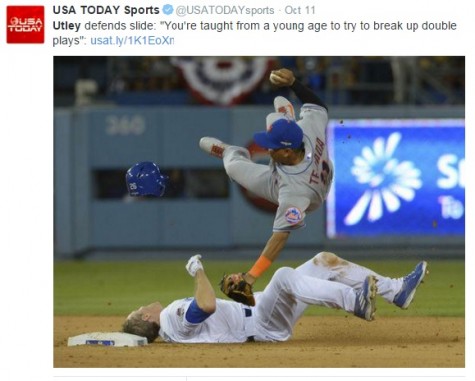Chase Utley called it good, hard baseball.
October 21, 2015
This statement came after Game 2 of the NLDS between the L.A. Dodgers and the New York Mets, an extremely heated game. Emotions were flying because of Utley’s controversial slide into Mets IF Rubén Tejada. Utley, attempting to break up a possible double play, slid late and hard into second base and hit Tejada as he turned to make the throw to first base. Tejada flipped, and was carried off by medical staff, who later determined that Tejada had broken his fibula.

Chase Utley’s slide sent Rubén Tejada airborne. Utley’s two-game suspension appeal has been postponed.
The outrage over the recent Dodgers acquisition’s slide, which cost Tejada his season, may bring change around to the game. There have been plenty of dirty slides throughout this season and previous. Why is change coming just now?
Had Tejada not broken his leg on the slide, I believe that most would’ve looked the other way. Hard slides happen fairly often in baseball, and unless serious injury occurs, no one really cares. However, this was a different case. According to statistics website FiveThirtyEight, Utley’s takeout raised the Dodgers’ win probability by 40%. Since this slide made such an impact, more people are looking at it in a harsh light.
For instance, up until 2014, slamming into the catcher at home plate was completely legal, and in some cases, applauded as a sign of hustle. However, an incident in 2011 spurred change, when reigning NL Rookie of the Year Buster Posey sustained a fractured fibula and torn ligaments in his ankle after getting steamrolled by outfielder Scott Cousins, costing Posey the remainder of the season. Suddenly, the San Francisco Giants’ season was in jeopardy only a year after winning the World Series. The team didn’t even make the NL playoffs. Just a few years later, blocking home plate was outlawed in attempts to reduce collisions at home plate.
While I agree change is needed, it’s not the rules that need to be changed. According to the 2015 MLB Handbook, “a batter is out when…a preceding runner shall, in the umpire’s judgment, intentionally interfere with a fielder who is attempting to catch a thrown ball or to throw a ball in an attempt to complete any play.” What Utley did was illegal according to the rules. However, umpires do not normally take action when plays of this nature occur. To discourage baserunners from making hard slides at second, umpires around the MLB must use their judgement and make it a norm to penalize offenders of this rule.
Plays like these are what define Utley’s style. However, no player intentionally injures another without a motive (unless you’re former Indian Albert Belle, who decided to throw an elbow in an attempt to break up a double play). Utley gets a bad rep because of his history, including another postseason slide in 2010 and another that same year against, amazingly, Tejada. The intent wasn’t to injure, according to Utley himself. It was to break up a double play.
However, the way Utley went about it, whether he intended to injure or not, was not justified. None of his previous slides have reached this level of criminality. While most “dirty” plays tend to be late slides, the most recent was not only late, but doesn’t even classify as a slide. Utley was perpendicular to Tejada when he slide in, causing Tejada’s leg to get caught under Utley’s body. The slide really classifies as more of a chop block.
While I do believe Utley should be punished for the slide, I think a two game suspension is too harsh. An ejection from the game probably would have been enough, and I wouldn’t be against the ruling if Utley took Game 3 off. But to cost a key player two games in a best-of-five series seems excessive. Intelligently, Utley appealed, and he was eligible for his suspended games.
In the end, it made no difference, as the Mets went on to win the series and advance. However, the crushing blow that Utley delivered will be felt by the Mets throughout the remainder of the playoffs. Moving forward, a similar incident of this magnitude should not happen again. Players cannot continue to take each other out without any sort of repercussions during the game. Change needs to happen now, and it starts with the umpires.